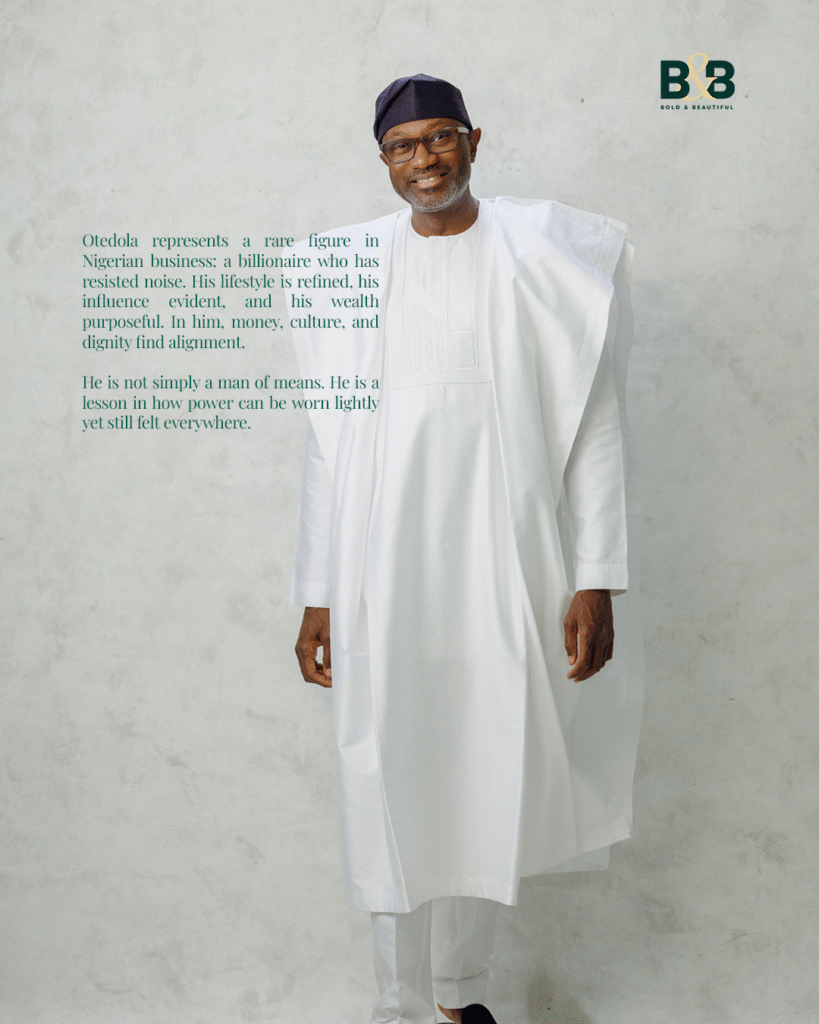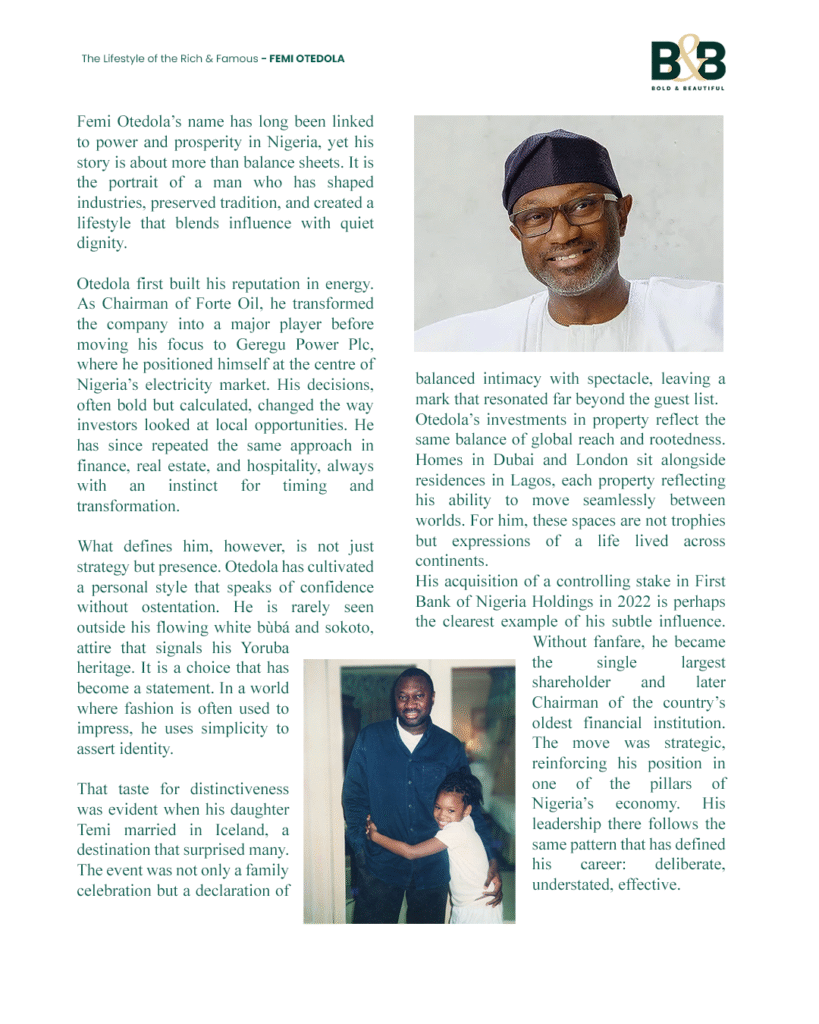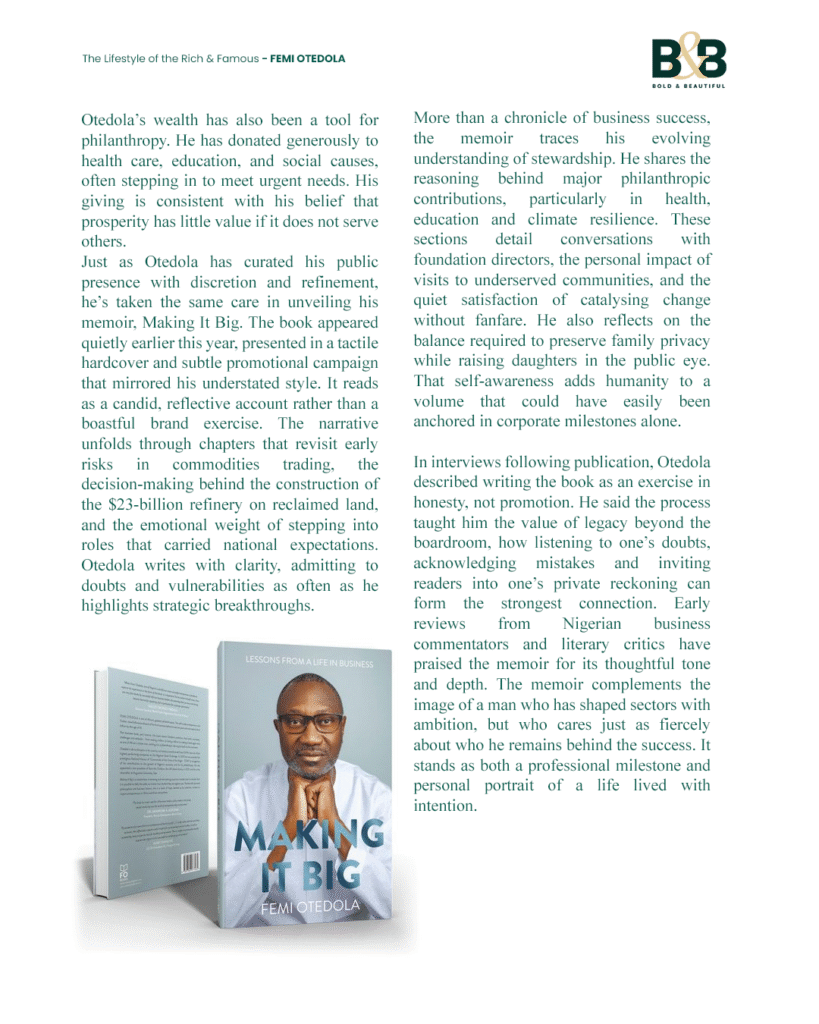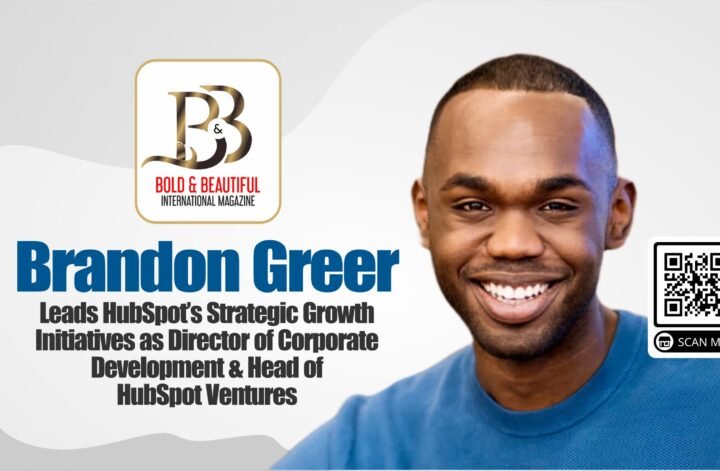Femi Otedola’s name has long been linked to power and prosperity in Nigeria, yet his story is about more than balance sheets. It is the portrait of a man who has shaped industries, preserved tradition, and created a lifestyle that blends influence with quiet dignity.

Otedola first built his reputation in energy. As Chairman of Forte Oil, he transformed the company into a major player before moving his focus to Geregu Power Plc, where he positioned himself at the centre of Nigeria’s electricity market. His decisions, often bold but calculated, changed the way investors looked at local opportunities. He has since repeated the same approach in finance, real estate, and hospitality, always with an instinct for timing and transformation.
What defines him, however, is not just strategy but presence. Otedola has cultivated a personal style that speaks of confidence without ostentation. He is rarely seen outside his flowing white bùbá and sokoto, attire that signals his Yoruba heritage. It is a choice that has become a statement. In a world where fashion is often used to impress, he uses simplicity to assert identity.
That taste for distinctiveness was evident when his daughter Temi married in Iceland, a destination that surprised many. The event was not only a family celebration but a declaration of elegance. Against the stark beauty of ice and lava, the Otedolas staged a wedding that balanced intimacy with spectacle, leaving a mark that resonated far beyond the guest list.
Otedola’s investments in property reflect the same balance of global reach and rootedness. Homes in Dubai and London sit alongside residences in Lagos, each property reflecting his ability to move seamlessly between worlds. For him, these spaces are not trophies but expressions of a life lived across continents.
His acquisition of a controlling stake in First Bank of Nigeria Holdings in 2022 is perhaps the clearest example of his subtle influence. Without fanfare, he became the single largest shareholder and later Chairman of the country’s oldest financial institution. The move was strategic, reinforcing his position in one of the pillars of Nigeria’s economy. His leadership there follows the same pattern that has defined his career: deliberate, understated, effective.

Otedola’s wealth has also been a tool for philanthropy. He has donated generously to health care, education, and social causes, often stepping in to meet urgent needs. His giving is consistent with his belief that prosperity has little value if it does not serve others.
At home, he is known as much for his role as a father as for his business ventures. His daughters have built successful careers in fashion, music, and film, becoming household names in their own right. Their accomplishments are part of his legacy, a sign that he has passed on not only resources but a standard of excellence.
Just as Otedola has curated his public presence with discretion and refinement, he’s taken the same care in unveiling his memoir, Making It Big. The book appeared quietly earlier this year, presented in a tactile hardcover and subtle promotional campaign that mirrored his understated style. It reads as a candid, reflective account rather than a boastful brand exercise. The narrative unfolds through chapters that revisit early risks in commodities trading, the decision-making behind the construction of the $23-billion refinery on reclaimed land, and the emotional weight of stepping into roles that carried national expectations. Otedola writes with clarity, admitting to doubts and vulnerabilities as often as he highlights strategic breakthroughs.
More than a chronicle of business success, the memoir traces his evolving understanding of stewardship. He shares the reasoning behind major philanthropic contributions, particularly in health, education and climate resilience. These sections detail conversations with foundation directors, the personal impact of visits to underserved communities, and the quiet satisfaction of catalysing change without fanfare. He also reflects on the balance required to preserve family privacy while raising daughters in the public eye. That self-awareness adds humanity to a volume that could have easily been anchored in corporate milestones alone.

In interviews following publication, Otedola described writing the book as an exercise in honesty, not promotion. He said the process taught him the value of legacy beyond the boardroom, how listening to one’s doubts, acknowledging mistakes and inviting readers into one’s private reckoning can form the strongest connection. Early reviews from Nigerian business commentators and literary critics have praised the memoir for its thoughtful tone and depth. The memoir complements the image of a man who has shaped sectors with ambition, but who cares just as fiercely about who he remains behind the success. It stands as both a professional milestone and personal portrait of a life lived with intention.
Otedola represents a rare figure in Nigerian business: a billionaire who has resisted noise. His lifestyle is refined, his influence evident, and his wealth purposeful. In him, money, culture, and dignity find alignment.
He is not simply a man of means. He is a lesson in how power can be worn lightly yet still felt everywhere.





